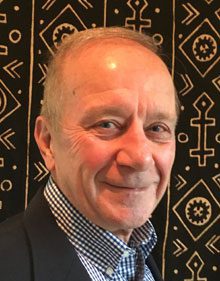 Recent stories of teachers going out of their way to insure students can continue learning as they shelter in place prompt me to reflect on the important role teachers have played in my life. One individual, George Brooks, stands out.
Recent stories of teachers going out of their way to insure students can continue learning as they shelter in place prompt me to reflect on the important role teachers have played in my life. One individual, George Brooks, stands out.
Brooks’s African history class at Indiana University in the late 1960s attracted odd characters. There was always a group of Peace Corps veterans, painfully thin, bespectacled young men and women, dressed in loose tie-dyes and sandals; there were sons (no daughters) of African ministers of state, better fed and wearing tailored suits and thin-soled loafers; there were young African Americans with natural hairdos, intent on learning about their heritage; and there were military academy graduates and proto-CIA operatives and the occasional offspring of missionaries. But the oddest person in Brooks’s class when I took it was a man of thirty-some years, who might pass today as one of the geeky characters in an old Gary Larson cartoon. His black hair was buzz cut in those days when long hair was everywhere. (Why, even I . . . .) He wore a heavy coat and winter boots through southern Indiana’s late-summer heat; then, when the weather turned windy and cold, he arrived in shorts and a dirty white t-shirt. He sat directly in front of Brooks’s lectern and never took a note. Instead, he stared straight ahead and, I hate to say, did indelicate things with his nose. And he could not sit still, shifting from side to side, shuffling his feet, and sliding his chair for no apparent reason.
What amazed me most was how Brooks seemed to go out of his way to treat the student with respect. The guy would come late to class most days, and when he arrived late he would sidle up next to the lectern and look through Brooks’s notes—as the professor was mid-lecture—seemingly in an effort to find out what he had missed. Brooks would simply ask the fellow to take his seat, noting he could catch up at the end of class. And Brooks, who always asked students to hold questions for the lecture’s end, watched this guy raise his hand two or three times mid-lecture, always with the same kind of inane question: “Was it two thousand Zulus killed at Blood River, or three thousand?” Brooks remained a model of patience, answering the question, “Three thousand,” and politely reminding everyone to hold questions. The other students looked at one another and rolled their eyes.
Some years later, after I got to know Brooks better, I asked how he managed to be so patient with, and tolerant of, the student. His answer was that you never know what’s going on with a person outside of class—that taking this course might be the biggest thing in his life—and you have no idea how important you might be to him, even to the extent that an easy joke at his expense might lead him toward the open window down the hall, seven floors up. Brooks said that he had a responsibility to educate but not to injure, to hold authority as Ashanti rulers along Africa’s Gold Coast did—as if it were an egg: neither so loosely as to drop it nor so tightly as to break it. This philosophy served his students well.
It’s a lesson I never forgot through my years of teaching. It remained on my mind the time a disturbed young woman sat in my office, calling me vile names. Loudly. (I winced only when she got to “hillbilly,” which hit close to home.) I remembered it, too, when an older student, a roofer by trade, came to my mid-afternoon final exam an hour late, dripping wet and middling drunk. (What I could make of his smudged essay was spirited, I thought.) And I called up Brooks’s memory when a rough-cut freshman from Buffalo informed me that he would be missing my first exam because his parents had gotten tickets to the Daytona 500; when an obese, narcoleptic student repeatedly fell asleep in my lectures—noisily, “BAM!” when his head hit his desk; and when a young woman continually forced every class discussion away from history and toward child abuse and domestic violence. It wasn’t always easy, but in these circumstances and others, I struggled not to hold the egg so tightly that I broke it, as Brooks admonished.
On reflection, I realize that Brooks’s attitude served me well personally, too. When I entered Indiana’s graduate program I was still young enough to believe that honesty was good policy. So I found Brooks in his office, introduced myself, and told him the truth: that I intended to major in African history, even though I had no African background or related experience or knowledge—didn’t even know where many of the countries were—and that I had not, heretofore, been sufficiently engaged in academic pursuits. I remember him breathing deeply and rubbing his temples as I sat talking, dressed to impress in my Madras-plaid shirt with the button-down collar, white Levi’s, and Bass Weejuns (no socks).
“Any focus you might have?” he asked, hopefully, “like West or East Africa, or the pre-colonial or colonial periods?”
“No, sir,” I declared, not quite sure when the pre-colonial ended and the colonial began.
“How’s your French?” he asked.
“Not so good,” I admitted.
He looked at me like a cow looks when its sole interest is in chewing what’s come up from one of its stomachs. Then he reached across his desk, picked up an African map with the national borders drawn in but without names, handed it to me, and said, “Well, here’s a place to start.”
The rest, I guess you would say, is history. I’ve often wondered what would have happened at that pregnant moment had he spoken sharply in reaction to my naïveté, scoffed at my ignorance, or even made an off-hand comment relating to my sockless presentation. I might have packed it in, returned to eastern Indiana, and gone back to driving a Coca-Cola truck. I almost certainly wouldn’t be sitting here writing this, retired from thirty-one years of teaching African history to students numbering in the many hundreds, some of whom were a little on the geeky side.
Donald Wright retired after 31 years as a professor at SUNY-Cortland, specializing in African history. He has written half a dozen books, held Fulbright, Rockefeller Foundation, and NEH Fellowships, and has lectured in South Africa, China, and on cruises along Africa’s Atlantic coast. He lives with his wife, Doris, in Beaufort.






